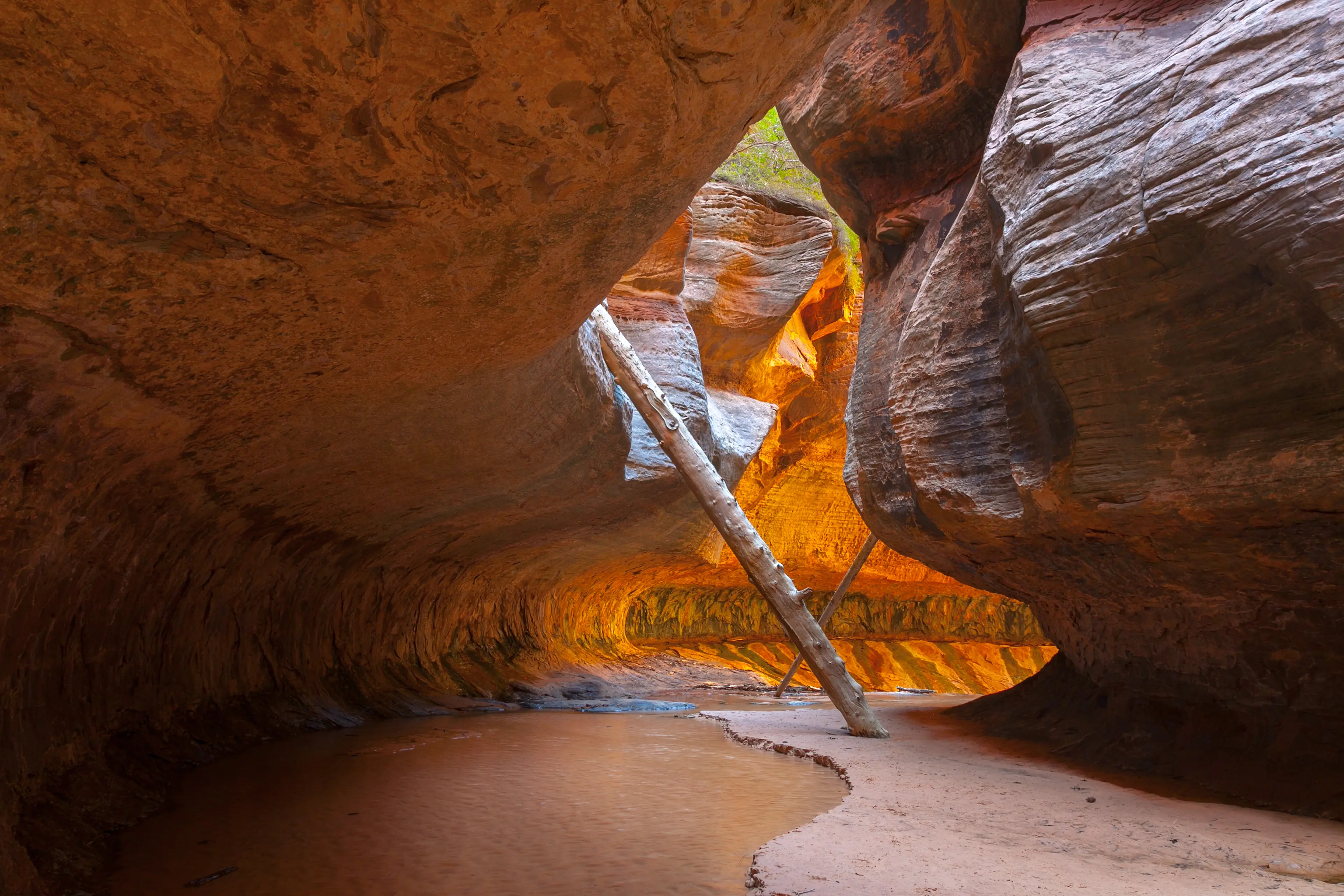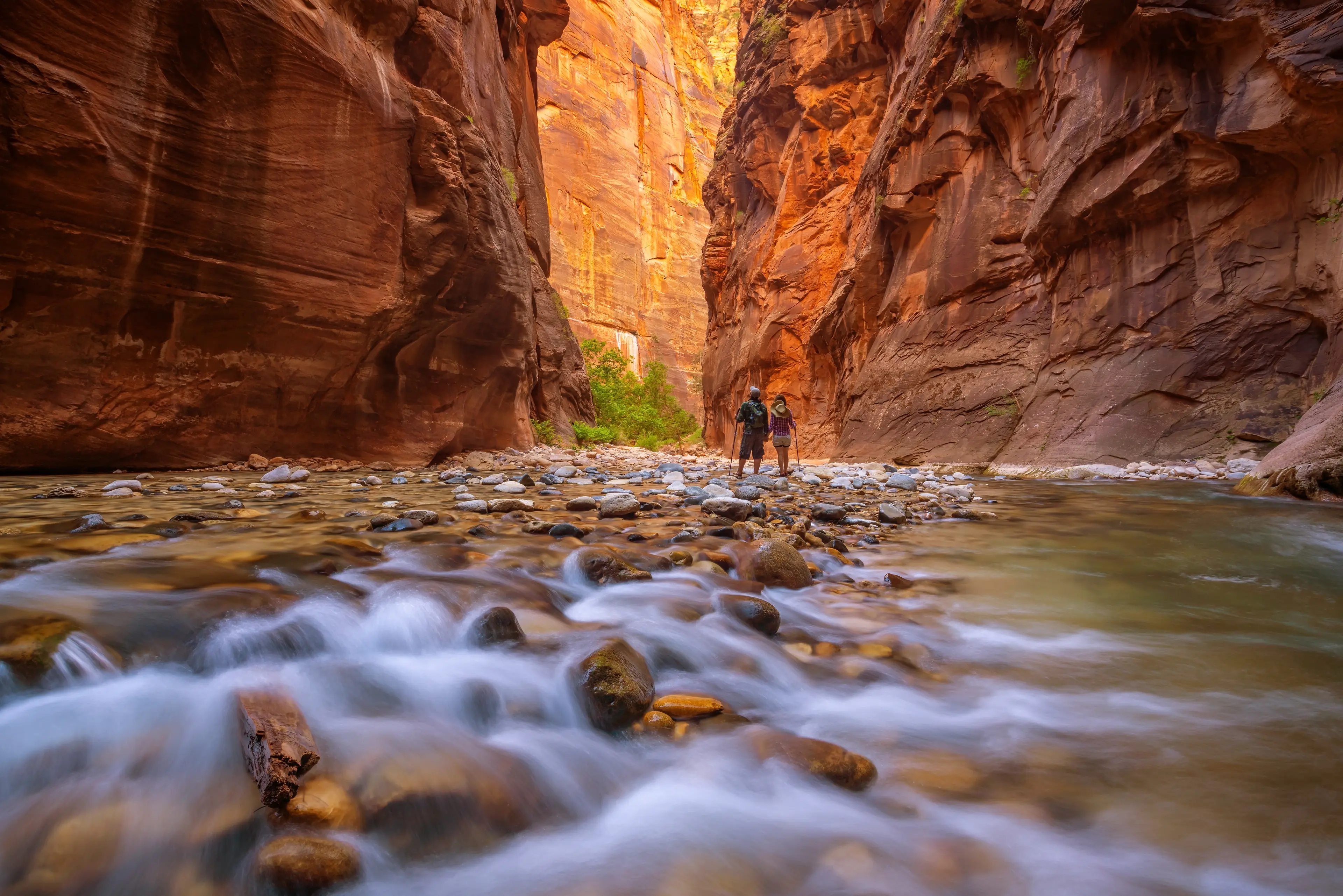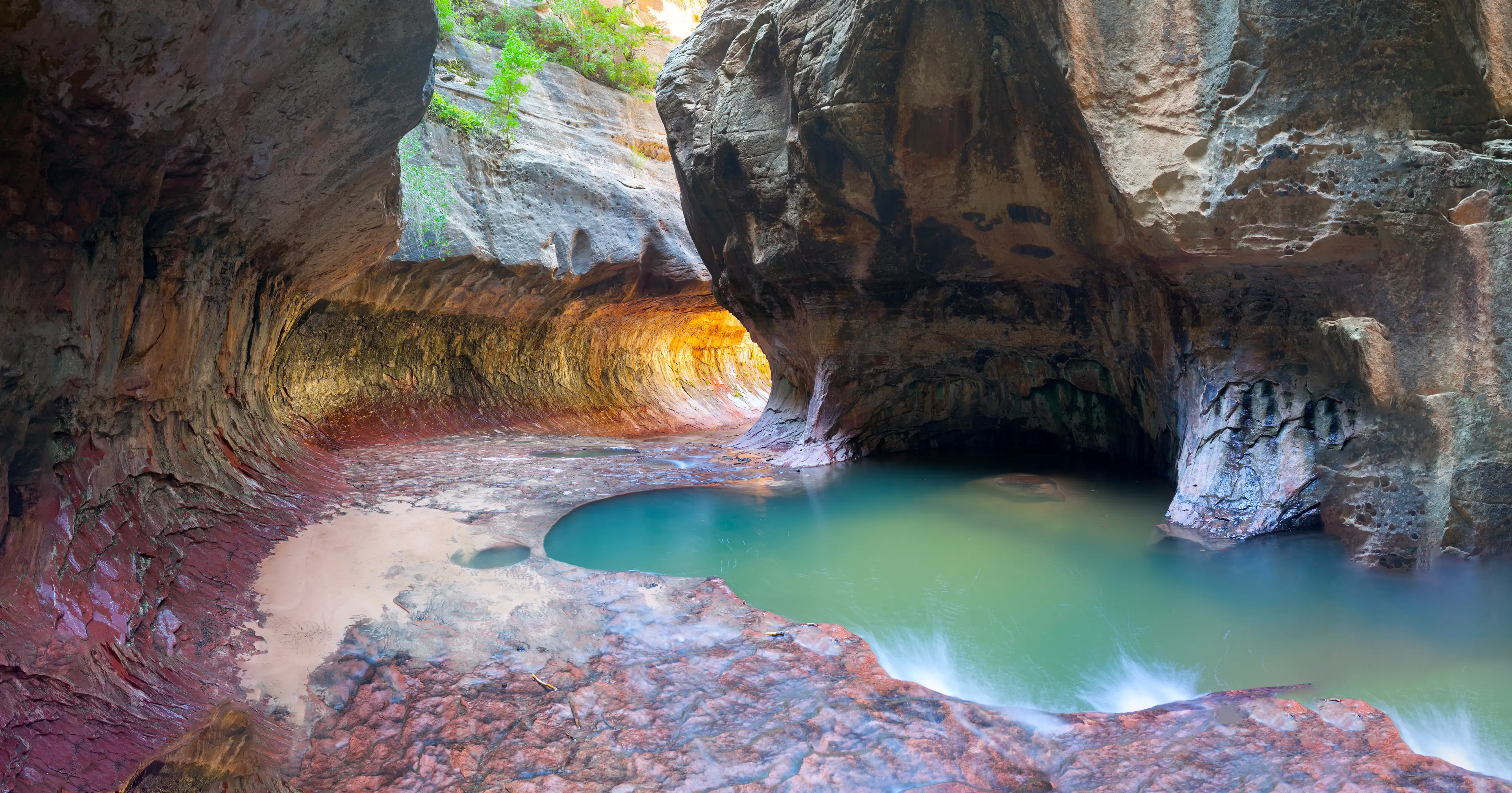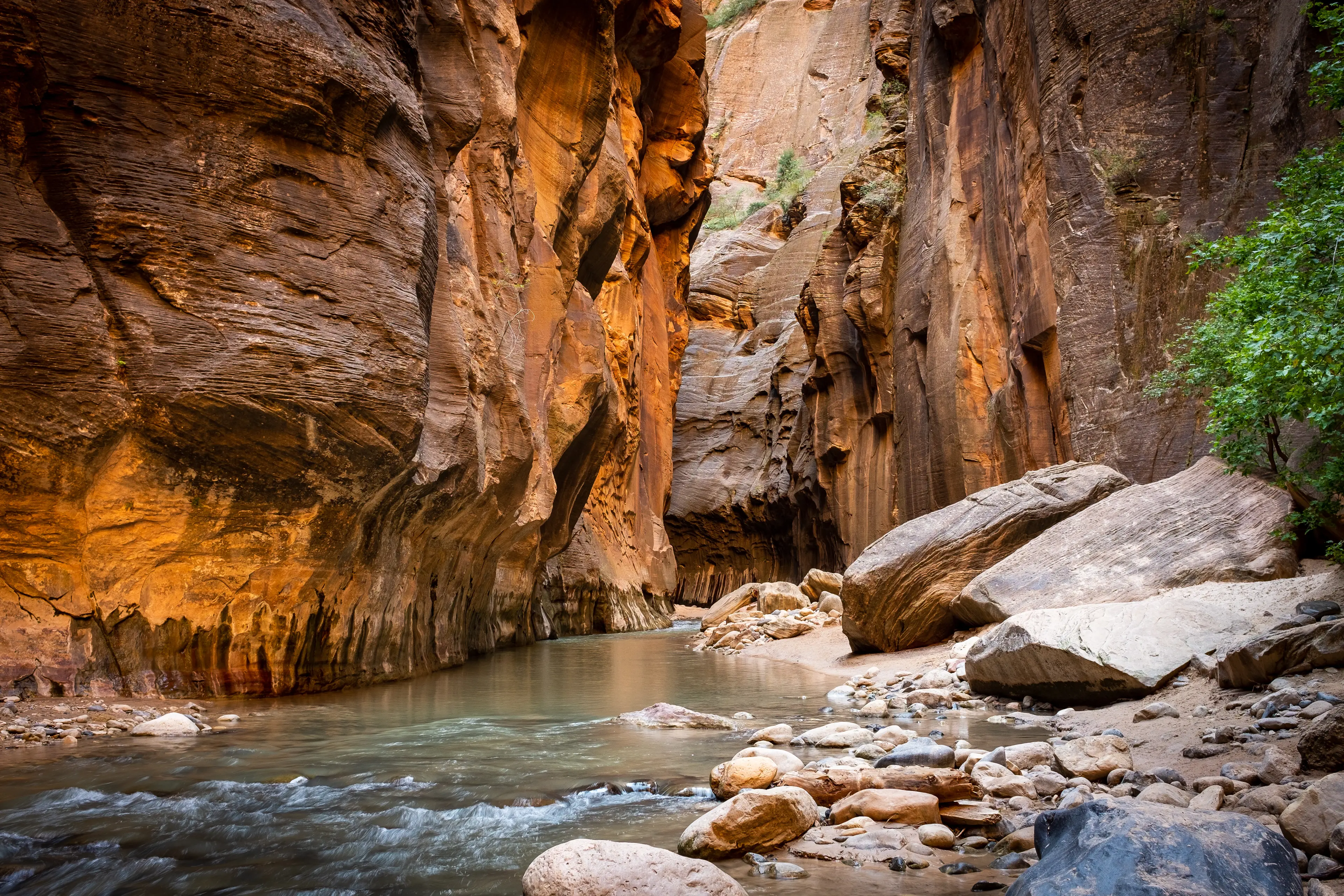1-Day Solo Adventure Itinerary: Exploring Zion National Park
Zion National Park, Utah
1 days





About Zion National Park, Utah
Experience the breathtaking beauty of Zion National Park, Utah. This natural wonderland offers a unique blend of awe-inspiring landscapes, diverse wildlife, and outdoor activities. Explore the stunning red cliffs, emerald pools, and the iconic Narrows, a gorge with walls a thousand feet tall and the river sometimes just twenty to thirty feet wide. Hiking, rock climbing, and bird watching are popular activities, with trails and routes for all skill levels. Discover the rich history and culture of the area through ranger-led programs. Whether you're seeking adventure or tranquility, Zion National Park provides an unforgettable journey into the heart of nature. Don't miss the chance to witness the majestic beauty of the park's star-filled night sky. Zion National Park is not just a destination, it's an experience that leaves visitors with lasting memories.
1-Day Itinerary
Attractions in Itinerary (2)

1Angels Landing
Angels Landing is a rock formation in Zion National Park in southwestern Utah in the United States. A trail cut into solid rock in 1926 leads to the top of Angels Landing and provides views of Zion Canyon.

2Zion National Park
Zion National Park is a southwest Utah nature preserve distinguished by Zion Canyon’s steep red cliffs. Zion Canyon Scenic Drive cuts through its main section, leading to forest trails along the Virgin River. The river flows to the Emerald Pools, which have waterfalls and a hanging garden.
Local Food and Drinks (12)

Utah Scones
A popular local food in Utah, these scones are deep-fried dough served with honey butter. They are a must-try for visitors to Zion National Park.

Pastrami Burger
A Utah staple, the Pastrami Burger is a beef patty topped with thinly sliced pastrami. It's a unique combination that visitors to Zion National Park should try.
Fry Sauce
Fry Sauce is a simple blend of ketchup and mayonnaise, and it's a Utah classic. It's often served with fries and burgers, and visitors to Zion National Park should definitely give it a try.

Funeral Potatoes
A traditional Utah dish, Funeral Potatoes are a cheesy potato casserole topped with a crunchy layer of cornflakes. It's a comfort food that visitors to Zion National Park should sample.
Green Jello
Green Jello is a popular dessert in Utah, often served with shredded carrots or whipped cream. It's a quirky local favorite that visitors to Zion National Park might enjoy.
Utah Truffles
Utah Truffles are a local specialty, made with high-quality chocolate. They're a must-try for any chocolate lover visiting Zion National Park.

Cherry Chicken
Cherry Chicken is a unique Utah dish, featuring chicken cooked with cherry sauce. It's a sweet and savory combination that visitors to Zion National Park should try.

Navajo Taco
Navajo Taco is a popular dish in Utah, featuring fry bread topped with beans, meat, cheese, and other taco fillings. It's a hearty meal that visitors to Zion National Park should sample.
Polygamy Porter
Polygamy Porter is a locally brewed beer in Utah. It's a dark, rich beer with a hint of chocolate and coffee. It's a must-try for beer lovers visiting Zion National Park.
High West Whiskey
High West Whiskey is a locally distilled spirit in Utah. It's a smooth, flavorful whiskey that visitors to Zion National Park might enjoy.

Apple Beer
Apple Beer is a non-alcoholic beverage that's popular in Utah. It's a sweet, refreshing drink that's perfect for cooling off after a day of exploring Zion National Park.

Root Beer
Root Beer is a classic American beverage, and Utah has its own unique versions. It's a sweet, frothy drink that visitors to Zion National Park might enjoy.
Best time to visit
The best time to visit Zion National Park, Utah, is typically from April to October. During these months, the weather is most favorable for outdoor activities such as hiking and camping. The park's free shuttle service is also available during this period, making it easier to explore. However, it's worth noting that this is also the peak tourist season, so the park can be crowded. If you prefer a quieter experience, consider visiting in the winter months, but be prepared for colder temperatures and potential snowfall.
How to get around
Shuttle Bus
Zion National Park provides a free shuttle bus service that operates in a loop, stopping at various points of interest throughout the park. The shuttle buses are wheelchair accessible and run frequently, making them a convenient option for getting around. The shuttle service operates from early morning until late evening.
Private Vehicle
Private vehicles are allowed in certain areas of the park, specifically on the Zion-Mount Carmel Highway and the Kolob Terrace Road. However, they are not allowed in the Zion Canyon Scenic Drive from April through October, when the shuttle bus service is in operation.
Ridesharing
Ridesharing services like Uber and Lyft are available in the towns surrounding Zion National Park, such as Springdale. However, they are not allowed to operate within the park itself. Visitors can use these services to get to the park's entrance, but will need to use the park's shuttle bus or walk to get around inside the park.
Bicycling
Bicycling is a popular way to get around Zion National Park. Bikes are allowed on all park roads, but not on hiking trails or off-road. Bike racks are available at all shuttle stops and points of interest. Please note that while biking can be a fun and environmentally friendly way to explore the park, it can also be challenging due to the park's hilly terrain.
Hiking
Many of Zion National Park's most beautiful and iconic locations can only be reached on foot. Hiking is a great way to explore the park at your own pace. There are trails suitable for all fitness levels, from easy walks to strenuous hikes. Always remember to bring plenty of water and wear appropriate footwear.
Horseback Riding
Horseback riding is another way to explore Zion National Park. Guided horseback tours are available, offering a unique perspective on the park's stunning landscapes. Please note that horseback riding is only permitted on designated trails and requires a permit.
Important information
Currency$ USD
Time zoneUTC-5
Driving sideRight
Emergency phone911
Drinking waterYes
Power sockets
Voltage120 V
Things to know about Zion National Park, Utah as a first time visitor
1
Zion National Park is open all year round, but certain areas may be closed due to weather conditions.
2
The park is located in the Mountain Time Zone.
3
The park's main visitor center, the Zion Canyon Visitor Center, is open daily except for December 25.
4
The park's entrance fee is $35 per vehicle or $20 per person for a 7-day pass. An annual pass is available for $70.
5
The park is very popular, so it's recommended to arrive early in the morning or late in the afternoon to avoid crowds.
6
Zion National Park has a shuttle system that operates from early spring to late fall, which is the only way to access the Zion Canyon Scenic Drive during these times.
7
Pets are allowed in the park, but they must be on a leash at all times and are only allowed on certain trails.
8
There are three campgrounds in Zion National Park. Reservations are recommended, especially during peak season.
9
The park has a desert climate, with high temperatures in the summer (up to 100°F/38°C) and cold temperatures in the winter (down to 20°F/-6°C).
10
Flash floods are a risk in the park, especially during monsoon season (July-September). Always check the weather forecast before hiking in narrow canyons.
11
There are no restaurants in the park, but there are picnic areas. It's recommended to bring your own food and plenty of water.
12
Cell service is limited in the park, so it's a good idea to download maps and other information you might need before you arrive.
13
The park has a Junior Ranger program for children aged 6-12. They can earn a badge by completing activities in the Junior Ranger booklet.
14
Zion National Park is home to a variety of wildlife, including deer, bighorn sheep, and many species of birds. Feeding wildlife is prohibited.
15
Fishing is allowed in the park, but a Utah fishing license is required.
16
Bicycles are allowed on park roads, but not on hiking trails or off-road.
17
The park has a 'Leave No Trace' policy. Visitors are asked to take all trash with them when they leave and to stay on designated trails.
18
Campfires are only allowed in designated fire rings at campgrounds. Collecting firewood in the park is prohibited.
19
The park has a bookstore where you can buy maps, books, and other educational materials about Zion National Park.
20
Zion National Park has an elevation range from 3,666 ft (1,117 m) to 8,726 ft (2,660 m), so altitude sickness can be a concern for some visitors.
Packing List
Clothing
Hiking boots
Lightweight clothing
Jacket or sweater for cooler temperatures
Rain jacket or poncho
Hat for sun protection
Sunglasses
Swimsuit (for the Virgin River)
Extra socks
Toiletries
Sunscreen
Insect repellent
First aid kit
Prescription medications
Toothbrush and toothpaste
Deodorant
Hand sanitizer
Travel documents and essentials
Valid ID
National Park pass (if you have one)
Cash and credit cards
Emergency contact information
Map of Zion National Park
Electronics and gadgets
Smartphone
Camera
Portable charger
Headlamp or flashlight
Binoculars
Miscellaneous items
Reusable water bottle
Snacks
Backpack
Hiking poles
Notebook and pen
Trash bags (Leave No Trace)
Weather Conditions
Visiting Zion National Park in Utah can be a breathtaking experience, but it's important to be prepared for the weather conditions you may encounter. The park experiences a range of weather conditions throughout the year, from scorching summer heat to chilly winter temperatures. During the summer months, temperatures can reach as high as 100°F (38°C), so it's crucial to stay hydrated and protect yourself from the sun. Lightweight, breathable clothing, a wide-brimmed hat, and sunscreen are must-haves. Also, consider starting your hikes early in the morning or later in the afternoon to avoid the peak heat of the day. In contrast, winter temperatures can drop to as low as 20°F (-6°C), so if you're planning a winter visit, pack warm clothing, including layers, hats, gloves, and insulated footwear. Snow and ice can also make trails slippery, so be sure to wear shoes with good traction. Spring and fall offer the most moderate temperatures, ranging from 50°F to 80°F (10°C to 27°C), making these seasons ideal for hiking and exploring. However, these seasons can also bring unpredictable weather, including rain and sudden temperature drops, so packing layers is a good idea. Regardless of when you visit, always check the weather forecast before heading out for the day and adjust your plans accordingly. Flash floods can occur after heavy rain, particularly in narrow canyons, so be aware of the risk and heed any warnings or advisories. Remember, weather can change rapidly in Zion National Park, so it's always best to be prepared for a variety of conditions. Enjoy your visit and stay safe!
| Month | Hi / Lo (°C) | Weather Overview |
|---|---|---|
January | 11° / -5° | January is the coldest month in Zion National Park, with occasional snowfall and icy trails. |
February | 13° / -3° | February is still quite chilly, but the park starts to thaw, making it a good time for less crowded visits. |
March | 17° / 0° | March sees a rise in temperature, with wildflowers starting to bloom and the park becoming more vibrant. |
April | 23° / 3° | April is a pleasant month with moderate temperatures, perfect for hiking and exploring the park. |
May | 28° / 8° | May is warm and sunny, with longer days allowing for extended exploration of the park. |
June | 33° / 13° | June is the start of the summer season, with high temperatures and crowded trails. |
July | 37° / 17° | July is the hottest month, with temperatures often exceeding 35°C, so remember to stay hydrated. |
August | 36° / 16° | August is still very hot, but the monsoon season can bring afternoon thunderstorms, adding a bit of unpredictability. |
September | 31° / 11° | September sees a drop in temperature and fewer crowds, making it a great time to visit. |
October | 25° / 5° | October offers comfortable temperatures and beautiful fall colors, a perfect combination for hiking. |
November | 20° / 0° | November is cooler, with fewer visitors and a peaceful atmosphere in the park. |
December | 13° / -3° | December is a quiet month in the park, with cold temperatures and occasional snowfall. |
Did you know?
Places near by Zion National Park, Utah

Bryce Canyon National Park
Famous for its unique geology, consisting of a series of horseshoe-shaped amphitheaters carved from the eastern edge of the Paunsaugunt Plateau
Cedar Breaks National Monument
A natural amphitheater canyon, stretching across 3 miles, with a depth of over 2,000 feet

Grand Staircase-Escalante National Monument
A vast area of multicolored cliffs, plateaus, mesas, buttes, pinnacles, and canyons

Snow Canyon State Park
A state park featuring a canyon carved from the red and white Navajo sandstone in the Red Mountains

Valley of Fire State Park
Nevada's oldest and largest state park, known for its stunning red sandstone formations

Antelope Island State Park
A state park known for its scenic beauty and opportunities for bird watching, hiking, camping, biking, and wildlife viewing

Capitol Reef National Park
A national park in south-central Utah, known for its 100-mile long wrinkle in the earth's crust
